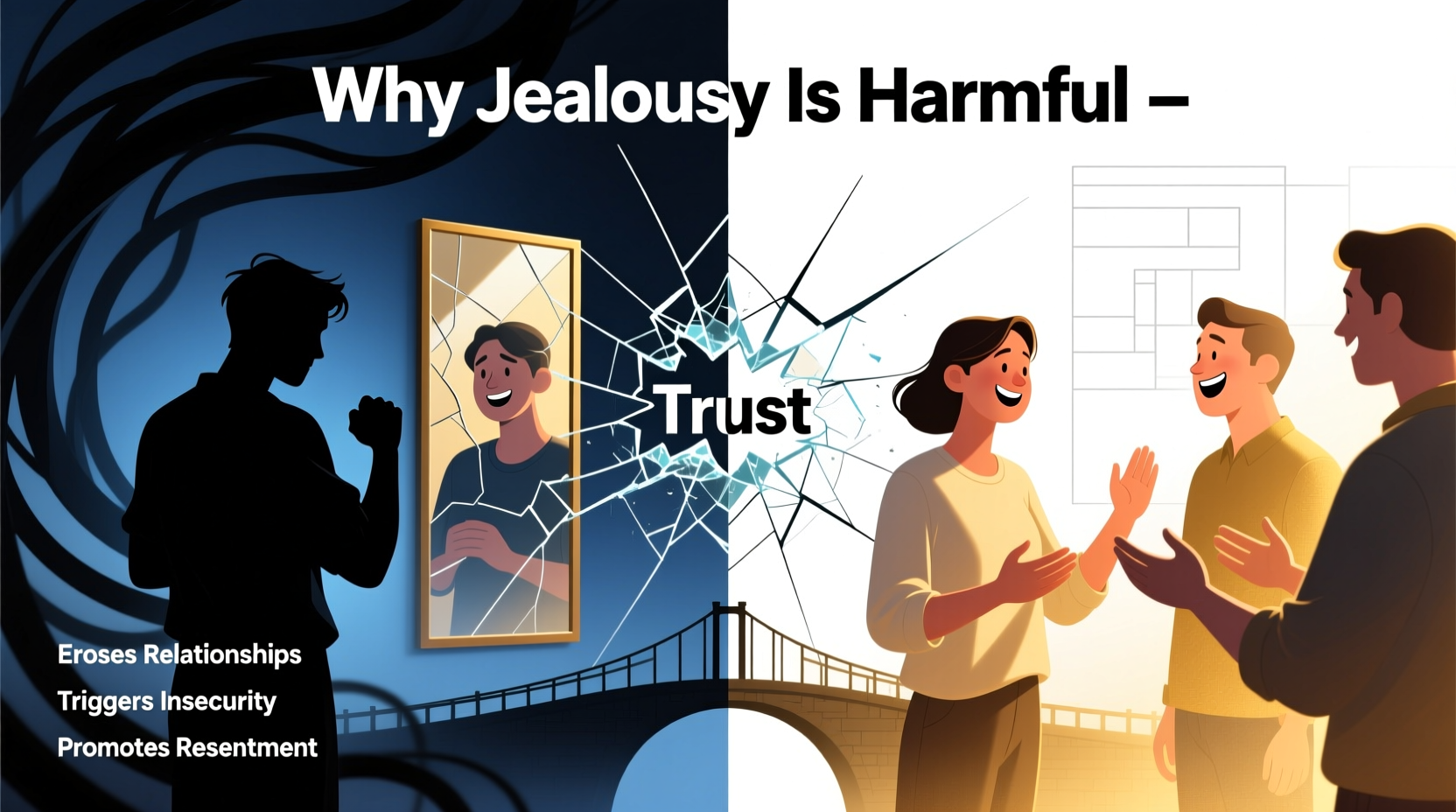Jealousy is a complex emotion that nearly everyone experiences at some point. Often rooted in fear, insecurity, or perceived threat, it can manifest in romantic relationships, friendships, family dynamics, and even professional environments. While mild jealousy might seem harmless—or even a sign of care—it quickly becomes destructive when left unchecked. Understanding why jealousy is bad isn’t about suppressing emotions; it’s about recognizing how unchecked jealousy damages trust, self-worth, and connection.
The Psychological Toll of Chronic Jealousy

At its core, jealousy stems from a fear of loss—whether it's losing affection, status, or control. When this fear becomes persistent, it triggers chronic stress responses in the brain. Elevated cortisol levels, sleep disturbances, and increased anxiety are common among individuals who struggle with recurring jealous thoughts.
Psychologists emphasize that jealousy often reflects deeper insecurities rather than actual threats. For example, someone who feels inadequate may interpret neutral social interactions as signs of betrayal. Over time, this distorts perception and erodes emotional well-being.
“Jealousy rarely arises from what others do—it stems from what we believe about ourselves.” — Dr. Lena Torres, Clinical Psychologist
Left unmanaged, chronic jealousy can contribute to depression, obsessive thinking, and emotional dependency. It shifts focus away from self-growth and onto external validation, trapping individuals in cycles of suspicion and emotional volatility.
How Jealousy Damages Relationships
Trust is the foundation of any healthy relationship. Jealousy undermines that foundation by introducing doubt, surveillance, and control. Partners may begin monitoring each other’s phones, questioning their social circles, or demanding constant reassurance—all behaviors that suffocate intimacy.
In romantic relationships, jealousy often leads to arguments over imagined slights. A simple text message from an acquaintance or a friendly interaction at work can be misinterpreted as flirtation. These misunderstandings escalate into conflict, breeding resentment on both sides.
Friendships suffer similarly. Envy over someone’s success or attention can breed passive-aggressive comments, withdrawal, or sabotage. Instead of celebrating others, the jealous individual competes or withdraws, weakening bonds that could otherwise be supportive and enriching.
Jealousy vs. Envy: Understanding the Difference
Though often used interchangeably, jealousy and envy are distinct emotions. Clarifying the difference helps in addressing them appropriately.
| Emotion | Definition | Focus | Common Trigger |
|---|---|---|---|
| Jealousy | Fear of losing something valuable (e.g., a relationship) to a rival | Triangular dynamic: self, partner, third party | Partner spending time with someone else |
| Envy | Desire for something another person has | Dyadic comparison: self vs. other | Friend getting a promotion or new car |
While both emotions involve comparison, jealousy is more emotionally volatile because it threatens relational security. Mislabeling envy as jealousy can lead to misplaced accusations—for instance, resenting a colleague’s raise but expressing it as distrust in their loyalty.
A Real-Life Scenario: The Cost of Misplaced Suspicion
Sophia, a 32-year-old marketing manager, began feeling uneasy when her partner, Mark, started working late on a team project with a female colleague. Though Mark shared updates openly, Sophia found herself obsessively checking his location, asking probing questions, and making sarcastic remarks about “work wives.”
Her behavior strained their communication. Mark felt distrusted and withdrew emotionally. After several tense weeks, he suggested couples counseling. Through therapy, Sophia realized her jealousy wasn’t about Mark’s actions—it was rooted in past betrayals and her own fear of being replaced.
With guided reflection and emotional regulation techniques, Sophia learned to separate her insecurities from reality. Their relationship improved not because Mark changed, but because Sophia addressed the internal triggers fueling her jealousy.
Step-by-Step Guide to Managing Jealous Feelings
Recognizing jealousy is the first step. Managing it requires deliberate, consistent effort. Follow this five-step process to regain emotional balance:
- Pause and Identify the Trigger
When jealousy arises, stop and name what sparked it. Was it a specific action, a tone of voice, or a memory? - Assess the Evidence
Ask: Is there factual proof of a threat, or am I interpreting neutral events negatively? - Reflect on Underlying Insecurities
Explore whether the emotion connects to self-worth, past trauma, or unmet needs. - Communicate Without Accusation
Use “I feel” statements instead of blaming. For example: “I felt anxious when you didn’t reply last night. Can we talk about it?” - Build Self-Confidence
Engage in activities that reinforce your value—exercise, creative projects, skill development—to reduce dependency on external validation.
Checklist: Signs Your Jealousy May Be Harmful
- You frequently monitor your partner’s phone or social media
- You feel intense anxiety when apart from your partner
- You make comparisons that leave you feeling inadequate
- You’ve accused someone of disloyalty without clear evidence
- Your relationships feel strained due to repeated conflicts about trust
- You avoid social events to prevent exposure to “threats”
- You prioritize control over connection
If three or more apply, consider speaking with a therapist. Early intervention prevents long-term relational damage.
FAQ: Common Questions About Jealousy
Is jealousy ever normal in a relationship?
Mild, occasional jealousy can be normal, especially during major life transitions. However, if it leads to controlling behavior, constant suspicion, or emotional distress, it’s no longer benign and requires attention.
Can jealousy be a sign of love?
No. Love is built on trust, respect, and security. Jealousy often masks insecurity, not devotion. Healthy relationships allow space for individuality without fear of loss.
What if my partner is actually flirting with others?
If behavior is genuinely inappropriate, address it directly with facts—not assumptions. Use observations like, “I noticed you were exchanging jokes with Sarah after meetings,” rather than, “You’re cheating on me.” Focus on boundaries, not accusations.
Conclusion: Choosing Growth Over Fear
Jealousy is not a flaw to be ashamed of—it’s a signal. Like pain in the body, it points to something needing attention. But unlike a reflex, it shouldn’t dictate actions. The true cost of jealousy isn’t just in broken arguments or lost trust; it’s in the opportunity cost of what could have been: deeper intimacy, authentic confidence, and freedom from fear.
By confronting jealousy with honesty and compassion, you reclaim agency over your emotional life. Replace suspicion with self-awareness, control with communication, and fear with courage. The goal isn’t to never feel jealous—it’s to respond in ways that honor both yourself and your relationships.









 浙公网安备
33010002000092号
浙公网安备
33010002000092号 浙B2-20120091-4
浙B2-20120091-4
Comments
No comments yet. Why don't you start the discussion?